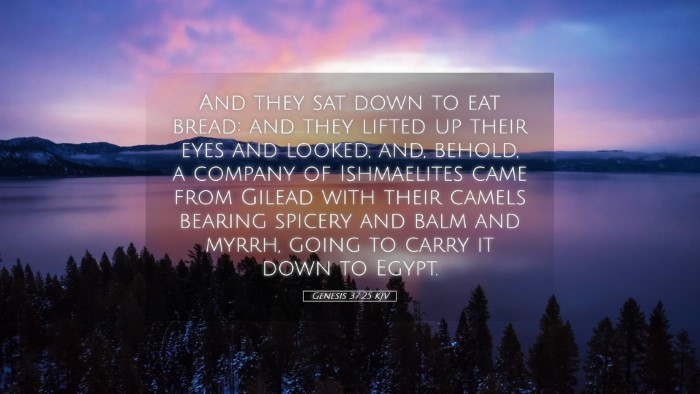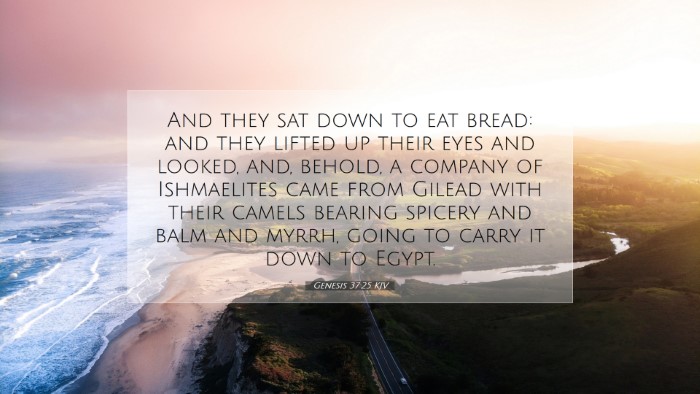Commentary on Genesis 37:25
Genesis 37:25 states: "And they sat down to eat bread: and they lifted up their eyes and looked, and, behold, a company of Ishmeelites came from Gilead with their camels bearing spicery and balm and myrrh, going to carry it down to Egypt."
Contextual Overview
The narrative in Genesis 37 centers around the family dynamics of Jacob and his sons, particularly Joseph's relationship with them. This verse depicts a critical moment when the brothers, after casting Joseph into a pit, take a moment to pause and eat, symbolizing a stark contrast between their coldness and Joseph's plight.
Matthew Henry's Commentary
Henry emphasizes the irony of the brothers' actions. While Joseph suffers in the pit, they are engaged in a mundane activity—eating. This speaks to a profound moral indifference. Henry notes that their meal signifies a detachment from familial bonds, suggesting that their inner conflict is overshadowed by their deliberation to rid themselves of Joseph.
Albert Barnes' Insight
Barnes brings forth the significance of the Ishmeelites as a pivotal moment in God's providential plan. He remarks on the implicit divine orchestration present in this moment, as these traders symbolize a broader narrative of Joseph being led to his future role in Egypt. The mention of "spicery and balm and myrrh" reflects the wealth and prosperity of trade routes, emphasizing God's plan for Joseph’s elevation.
The Theological Implications
Barnes asserts that the brothers’ act of eating without remorse reflects a dangerous human tendency to become callous in the face of wrongdoing. Moreover, the encounter with the Ishmeelites serves as a reminder of God’s sovereign influence over human decisions and actions, steering Joseph towards his destiny despite the scheme of his brothers.
Adam Clarke's Analysis
Clarke highlights the geographical and cultural significance of the Ishmeelites’ journey. He elucidates that their trade represents not only the economic reality of ancient Israel but also the interconnectedness of society in the region. The spices mentioned enhance the text's richness, portraying the commerce of Egypt as extravagant.
The Characterization of the Brothers
Clarke points out that the brothers’ pause for food showcases a momentary oblivion to the ethical weight of their actions. Their camaraderie over a meal starkly contrasts with the betrayal they have committed, illustrating a profound moral failure. This suggests a broader theme in scripture regarding the danger of unchecked human relationships.
The Role of Divine Providence
These commentaries collectively lead to an understanding of divine providence interwoven within human actions. While the brothers engage in cruel betrayal, the Ishmeelites signify the means by which God will later fulfill His promises through Joseph's life. The event foreshadows the coming deliverance of Israel through Joseph's subsequent rise to power in Egypt.
Broader Themes for Reflection
- Moral Responsibility: The indifference of Joseph's brothers raises questions on moral accountability in light of egregious actions.
- Divine Sovereignty: Despite human intentions, God's will prevails, reminding believers that He can utilize even our missteps for His greater purpose.
- The Human Condition: The emotional and ethical vacuity of the brothers serves as a cautionary tale about the consequences of jealousy and hatred.
Conclusion
The insights from Henry, Barnes, and Clarke converge to present Genesis 37:25 as a multifaceted verse that encapsulates themes of moral failure, divine sovereignty, and the complex nature of human relationships. For pastors, students, and theologians, it serves as a rich text for reflection on how God often works through less-than-ideal human circumstances to bring about His intended outcomes.


